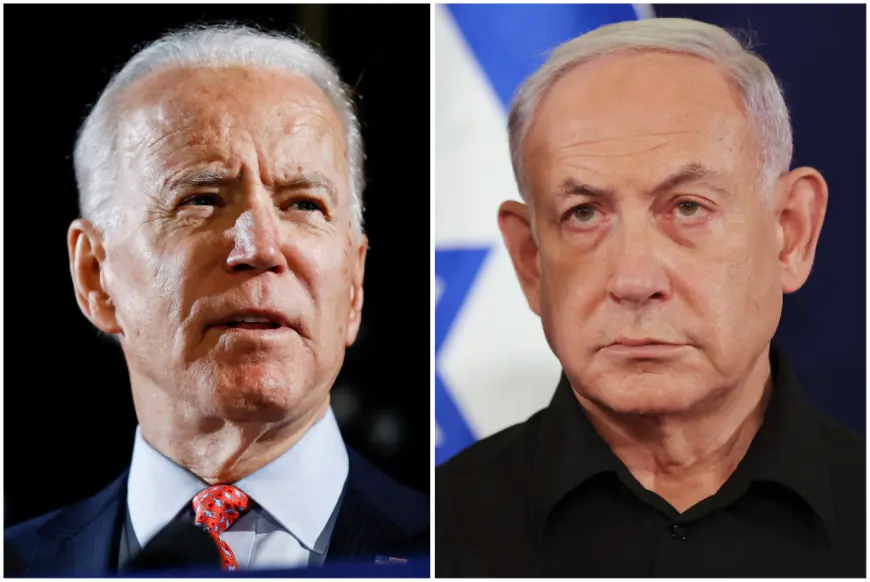Kristof: Biden has an opportunity now in Gaza, but only if he pushes
Even after killing of Sinwar, the president's hopes for a historic peace deal are unlikely without greater U.S. pressure.

The question now is: Can Israeli Prime Minister Benjamin Netanyahu be pressured to declare victory and end the war in the Gaza Strip?
Netanyahu now can take the best kind of off-ramp. He can savor the killing of Yahya Sinwar — a terrorist with so much Israeli and Palestinian blood on his hands — while triumphantly declaring that Israel’s war in Gaza has succeeded. Then he can try to negotiate a cease-fire that would include the release of hostages, eventual normalization of relations with Saudi Arabia and a path to a two-state solution.
U.S. officials keep using the word “opportunity,” and they’re right. As Vice President Kamala Harris put it, “This moment gives us an opportunity to finally end the war in Gaza.”
I’m sure Biden wants a historic peace deal, but I’m skeptical about how likely that is unless there’s significantly greater pressure from the United States. Sinwar will be replaced, perhaps by someone just as hard-line, and Hamas has already said fighting will continue — just as the assassination of Hassan Nasrallah did not eliminate Hezbollah or end fighting in Lebanon.
Israel’s response
Any day we may see an Israeli retaliatory strike against Iran that leads to another strike by Tehran and a military escalation that dampens our current sense of “opportunity.”
Israel keeps racking up significant tactical victories, like Sinwar’s elimination, but they don’t add up to a strategy. We still don’t see from Netanyahu a day-after plan for either Gaza or the West Bank. Avril Haines, director of national intelligence in the United States, has warned that the Israel-Hamas war may stoke a “generational” threat from terrorism. On past visits to Gaza before the war, I would sometimes have heartbreaking interviews with children who had suffered so much that when I asked what they wanted to be when they grew up, they would reply: martyrs. Palestinian and Israeli extremism feed each other.
Netanyahu’s initial reaction to Sinwar’s killing wasn’t promising. “Our task has still not been completed,” he declared, adding that in Gaza “we will continue full force” until all hostages are released. Unfortunately, continuing full force is much less likely to free hostages than a serious effort at a cease-fire would.
So count me doubtful that Hamas will fold or that Israel will easily embrace Biden’s ideas for a multifaceted peace deal. Netanyahu is still focused on what is good for himself, and Israel is still so traumatized by Oct. 7, 2023, that it would be difficult for the public to accept a real plan for a two-state solution. (In fact, I worry that Saudi Arabia and the United States will concoct some kind of a vague “path” to statehood that is mostly a mirage.)
An obstacle to any peace deal is that Palestinian Authority leadership is corrupt and discredited. So a useful step would be for Israel to release Marwan Barghouti, perhaps the most popular Palestinian leader, from the Israeli prison where he is serving life sentences for murder. As one former Israeli security chief said in urging his release, Barghouti is “the only leader who can lead Palestinians to a state alongside Israel.”
One gauge of the diplomatic challenge: A poll in July found that 66% of Israeli Jews believe that Palestinians’ intentions are “to commit genocide against us,” while 61% of Palestinians believe that the aim of Israel is “to commit genocide against us.” With each side seeing the other as genocidal killers, Secretary of State Antony Blinken will have his hands full.
No other choice
And yet! What other choice is there? Sinwar hoped to create a larger war in the Middle East, and with help from Iran and Hezbollah, Netanyahu has largely granted his wish. The way to defeat Sinwar’s legacy and make him roll unhappily in his grave is to push relentlessly for a lasting peace.
Yet instead of conciliation, we’re unfortunately seeing some signs of a harder line in Jerusalem. Less aid entered Gaza last month than in any period since the Oct. 7 terror attack, the United States said, and some think Israel is pursuing a retired general’s proposed starvation strategy in northern Gaza. Hunger appears widespread, and Israel reportedly has continued to attack aid convoys on occasion.
What’s more, to some Israelis the lesson of Sinwar’s killing is precisely the importance of resisting American pressure. That narrative is: You Americans are hand-wringing wimps who told us not to go into Rafah, but we did anyway and finally killed Sinwar. Get off our backs, and we’ll finish the job.
Can anything interrupt that dynamic? I’m not sure, but in April and early May, Biden did briefly get tough with Israel and suspended at least one shipment of 2,000-pound bombs. Israel then snapped to attention, listened to the White House and increased aid deliveries to Gaza. But after it became apparent that Biden was bluffing and blustering, Netanyahu resumed his intransigence and his humiliation of Washington.
For the past year, Biden has tried a bear-hug approach to influence Netanyahu but has barely employed the enormous leverage the United States has as it supplies weaponry and spare parts for Israel’s wars. A few days ago, Biden administration officials did hint that the United States might cut back on weapons transfers unless Israel allows more food into Gaza — but they immediately undermined that message by delaying a reckoning for 30 days.
Biden is a good man who truly does want peace and understands how the Middle East has devastated his legacy, but he has been too passive as 3,100 children under the age of 5 have died in Gaza on his watch and as hostages have endured endless, unimaginable suffering. So I’m hoping that he appreciates that this last, best opportunity to wrest peace from Sinwar’s death depends on his use of sticks as well as carrots during his final three months in office.
Nicholas Kristof is New York Times columnist.
What's Your Reaction?









































































































